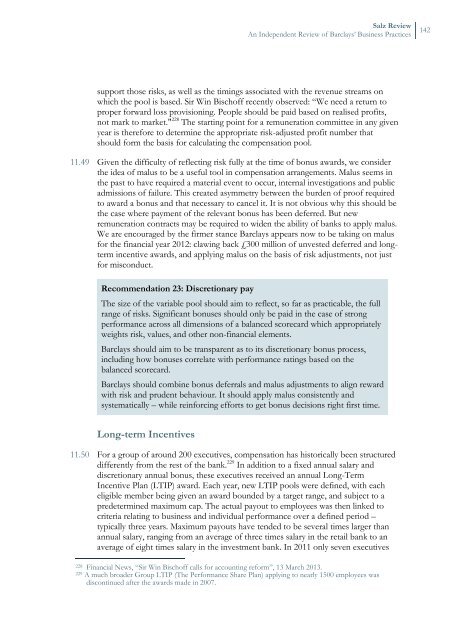Salz Review - Wall Street Journal
Salz Review - Wall Street Journal
Salz Review - Wall Street Journal
You also want an ePaper? Increase the reach of your titles
YUMPU automatically turns print PDFs into web optimized ePapers that Google loves.
<strong>Salz</strong> <strong>Review</strong><br />
An Independent <strong>Review</strong> of Barclays’ Business Practices<br />
142<br />
support those risks, as well as the timings associated with the revenue streams on<br />
which the pool is based. Sir Win Bischoff recently observed: “We need a return to<br />
proper forward loss provisioning. People should be paid based on realised profits,<br />
not mark to market." 228 The starting point for a remuneration committee in any given<br />
year is therefore to determine the appropriate risk-adjusted profit number that<br />
should form the basis for calculating the compensation pool.<br />
11.49 Given the difficulty of reflecting risk fully at the time of bonus awards, we consider<br />
the idea of malus to be a useful tool in compensation arrangements. Malus seems in<br />
the past to have required a material event to occur, internal investigations and public<br />
admissions of failure. This created asymmetry between the burden of proof required<br />
to award a bonus and that necessary to cancel it. It is not obvious why this should be<br />
the case where payment of the relevant bonus has been deferred. But new<br />
remuneration contracts may be required to widen the ability of banks to apply malus.<br />
We are encouraged by the firmer stance Barclays appears now to be taking on malus<br />
for the financial year 2012: clawing back £300 million of unvested deferred and longterm<br />
incentive awards, and applying malus on the basis of risk adjustments, not just<br />
for misconduct.<br />
Recommendation 23: Discretionary pay<br />
The size of the variable pool should aim to reflect, so far as practicable, the full<br />
range of risks. Significant bonuses should only be paid in the case of strong<br />
performance across all dimensions of a balanced scorecard which appropriately<br />
weights risk, values, and other non-financial elements.<br />
Barclays should aim to be transparent as to its discretionary bonus process,<br />
including how bonuses correlate with performance ratings based on the<br />
balanced scorecard.<br />
Barclays should combine bonus deferrals and malus adjustments to align reward<br />
with risk and prudent behaviour. It should apply malus consistently and<br />
systematically – while reinforcing efforts to get bonus decisions right first time.<br />
Long-term Incentives<br />
11.50 For a group of around 200 executives, compensation has historically been structured<br />
differently from the rest of the bank. 229 In addition to a fixed annual salary and<br />
discretionary annual bonus, these executives received an annual Long-Term<br />
Incentive Plan (LTIP) award. Each year, new LTIP pools were defined, with each<br />
eligible member being given an award bounded by a target range, and subject to a<br />
predetermined maximum cap. The actual payout to employees was then linked to<br />
criteria relating to business and individual performance over a defined period –<br />
typically three years. Maximum payouts have tended to be several times larger than<br />
annual salary, ranging from an average of three times salary in the retail bank to an<br />
average of eight times salary in the investment bank. In 2011 only seven executives<br />
228 Financial News, “Sir Win Bischoff calls for accounting reform”, 13 March 2013.<br />
229 A much broader Group LTIP (The Performance Share Plan) applying to nearly 1500 employees was<br />
discontinued after the awards made in 2007.
















